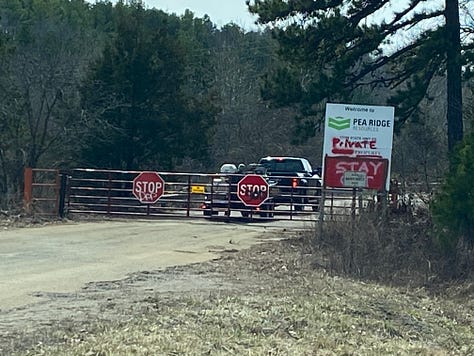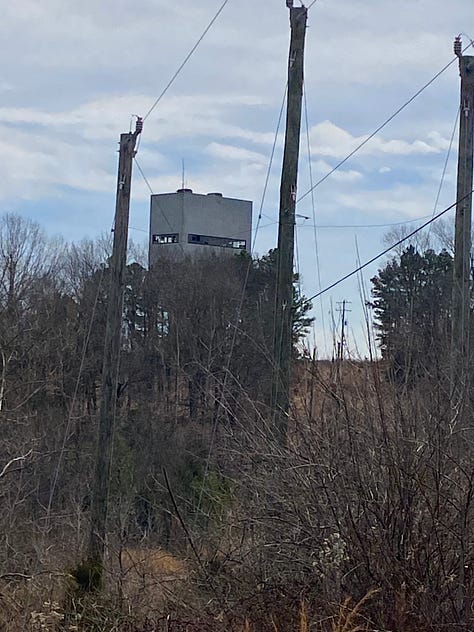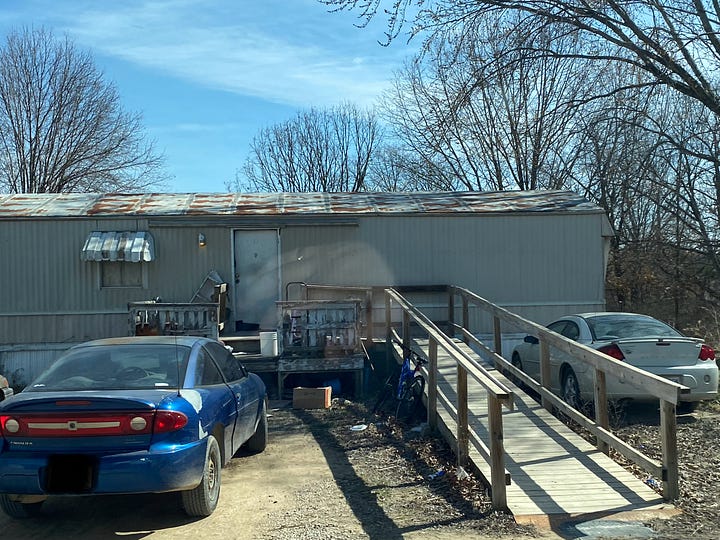Dave Schatz: Tragedy, Power, and Machinations
Dave Schatz is a Shakespearean character. He’s on par with Macbeth or King Claudius. The world was given to him through unjust means—now it’s time to upend the stage set by Kehoe.
From Tragedy to Politics: A Man Marked by Loss
Dave Schatz’s life has been defined by profound loss and a lingering sense of suspicion. In March 1992, his father, Neil Schatz, a 55-year-old Franklin County Commissioner, committed a horrific murder-suicide at their rural farmhouse near Sullivan, Missouri. Using a 12-gauge shotgun, Neil killed his wife Sarah (53), his son Neil Jr. (32), his daughter Cindy Schatz Lamb (30), and his grandsons Brett (8) and Ryan (3 months) before taking his own life. The bodies were discovered the next morning by Neil’s mother and another family member, leaving the small community of Sullivan—population around 5,500 at the time—in shock. Authorities, including Franklin County Sheriff Gary Toelke, determined that Neil had been struggling with depression, exacerbated by a recent change in medication for heart disease and high blood pressure. Despite appearing calm at a family gathering the night before, something “snapped,” leading to the tragedy, as reported by the Los Angeles Times and New York Times.
At the time, rumors circulated that Neil’s actions were tied to trouble with the Chicago Mob, given his role as a county commissioner and contractor. However, no evidence supports this claim. The Chicago Outfit and Kansas City crime family were active in Missouri during the era, but their operations were centered in urban areas, not rural Franklin County, and no documented link to Neil Schatz exists, as noted in historical FBI records. The tragedy appears to have been a result of Neil’s personal struggles, not external vendettas. Dave Schatz, who was not among the victims, survived this devastating event, but it left him deeply scarred. Rather than fostering resilience, the loss marked him as a man perpetually looking over his shoulder, wary of unseen threats.
Years later, another tragedy propelled Dave into politics: the death of his son in a car accident. According to a source, Dave believed this was no accident but a deliberate act meant to send him a message, though no evidence confirms this suspicion. Driven by this loss, Schatz ran for state representative, seeking to influence change and perhaps protect others from the forces he felt had targeted his family. He served two terms in the Missouri Senate, representing District 26 from 2015 to January 2023, including four years as Senate President Pro Tem (2019–2023), and spent time in the Missouri House from 2011 to 2015, building a reputation as a seasoned politician.
During his tenure, Schatz helped pass the controversial 2021 gas tax bill alongside then-Lt. Governor Mike Kehoe, a decision that sparked a rivalry with State Senator Mike Moon and drew ire from constituents. While in the Senate, Schatz reportedly forged ties with the Missouri Gaming Commission and other influential entities, connections that enriched him. After losing his 2022 bid for the U.S. Senate seat vacated by Roy Blunt, where he was defeated in the Republican primary, Schatz returned wealthier than he left, raising questions about his financial dealings and potential conflicts of interest.
The Pea Ridge Mine and Sullivan’s Toxic Legacy: Environmental Threats
The Pea Ridge Mine, located in Washington County, Missouri, approximately 10-20 miles south of Sullivan, is a significant geological site with a history of iron ore production from 1963 to 2001. It’s also one of the largest known deposits of rare earth elements (REEs) in the U.S., critical for technologies like electric vehicles, wind turbines, and defense systems.
Recent developments, including a new electrical substation and road construction photographed in March 2025, suggest the mine may be preparing to reopen, driven by global demand for REEs. However, mining REEs poses serious environmental risks, including groundwater contamination, toxic runoff, and air pollution from heavy metals and radioactive elements.
The Missouri Department of Natural Resources (MODNR) has been overseeing hazardous waste management at the Pea Ridge Mine, as detailed in their report on the facility (MOD094390416).






The mine, operated by the Pea Ridge Iron Ore Company (now under Caldera Holding, LLC ownership), was listed as a hazardous waste treatment, storage, and disposal (TSD) facility due to its past operations.
MODNR’s oversight includes monitoring groundwater and soil for contaminants, as mining activities can release toxic substances into the environment. While the specific contaminants at Pea Ridge are not detailed in the report summary, REE mining often involves radioactive elements like thorium and uranium, as well as heavy metals, which can contaminate groundwater and air. The monitoring tower photographed near the mine indicates ongoing environmental oversight, but the new substation suggests increased activity, which could strain existing protections.
Closer to home, Sullivan itself has a toxic legacy tied to the former TRW facility at 300 Ramsey St., known locally as the Ramsey building. Originally the Ramsey Building was the structure in Sullivan’s industrial park—it was bought from the military-industrial complex, the building was expanded to 100,000 square feet by a local family member, reflecting its significant industrial history.
From 1950 to 1983, the Ramsey Corp. Inc. operated the facility, manufacturing automobile piston rings using a chrome plating system that relied on organic solvents and petroleum-based products. Wastes produced included spent trichloroethene (TCE) solvent and sludge, wastewater, chrome plating sludge, and used oil. Ramsey installed three wastewater treatment lagoons and one sludge storage lagoon (later divided into two) to manage these wastes, but the parking lot was built over toxic soil from a former brake facility that used degreasers, with asphalt laid on top to cover it, potentially allowing TCE to vaporize into the air.
Initial investigations in 1989 confirmed that on-site groundwater was contaminated with volatile organic compounds, chromium, and lead, prompting further action. The Environmental Protection Agency (EPA) issued a Corrective Action Administrative Order on Consent in 1993, requiring TRW, Sullivan Warehousing, Sister Property, and Rokwell Industries to conduct a RCRA Facility Investigation and Corrective Measures Study. These investigations confirmed substantial groundwater contamination from the facility, including TCE levels in a City of Sullivan municipal water supply well that exceeded acceptable drinking water standards.
TCE is the same chemical that environmental activist Erin Brockovich famously linked to cancer in her 1990s case against Pacific Gas & Electric in Hinkley, California, where it contaminated groundwater and was associated with increased rates of leukemia and other health issues, a story later depicted in the 2000 film Erin Brockovich. The facility now operates a groundwater pump and treatment system with two recovery wells and an air stripper, while the city’s well uses air stripping and chlorination to make the water safe for drinking.
Continued pumping of the city’s well also helps control the migration of contaminated groundwater. In 2000, a Deed Notice was placed on the property to inform future buyers of the hazardous waste, and in 2002, TRW merged with Northrop Grumman (an American Aerospace and Defense Corporation with revenue in excess of $40B), a connection multiple sources highlighted in their allegations.
As of July 2017, MODNR, EPA, and TRW entered a Corrective Action Abatement Order on Consent to implement a final remedy, including groundwater monitoring and enhanced institutional controls. Yet, the closure and cleanup haven’t occurred. The speculation is that it is more profitable for the DOR and the City of Sullivan to collect the fines that it is to clean up the toxic chemical.

MODNR’s webpage for the TRW facility provides contact information for further inquiries, listing Christine Kump as the MODNR contact (email) and Robert Bleazard of TRW Automotive Inc. as the facility contact (phone: 480-722-4866). Hard copies of regulatory mechanisms, modifications, reports, and supporting documents are available at the MODNR office in Jefferson City, MO (Elm Street Conference Center, 65102), though no EPA hardcopy location is specified [link].
Multiple sources raised concerns about this contamination, alleging that a storage tank at the Ramsey building, located near the original brick structure, is full of toxic chemicals and flushes them into Sullivan’s drinking water through piping that connects to the city’s plumbing system.

They described an unassuming watershed near the building as the entry point for this contaminated water, suggesting that sampling from residents’ faucets might be the only way to test it due to restricted access to the site, which is secured with barbed wire and fencing.
They claimed the tank was supposed to be removed in 2017 but remains, with the city collecting fines instead, possibly as a revenue stream, a practice that aligns with the MODNR report’s timeline but indicates incomplete remediation. The MODNR report confirms the presence of toxic sludge and contaminated water, validating fears about the Ramsey building’s impact on Sullivan’s environment. The ongoing TCE contamination in the municipal well, combined with the potential for vaporization from the covered toxic soil, underscores the severity of the issue.
The Pea Ridge Mine’s potential reopening could exacerbate regional environmental concerns if contaminants travel through the Meramec River or groundwater, compounding Sullivan’s existing toxic challenges.
Mercy Hospital in Sullivan, built on a toxic water field where TCE vaporizes into the air, poses additional health risks, particularly to undocumented immigrants who walk nearby, further highlighting a pattern of prioritizing development over public health. Multiple sources noted that this field, now a marsh, serves as a drainage area for toxic water, exacerbating the community’s exposure to harmful substances.
Sullivan’s Crime Crisis
Sullivan is facing a crime wave that has left residents feeling unsafe. According to 2022 FBI data cited in my article on Sullivan, the overall crime rate in Sullivan is 1 in 18, with property crime at 1 in 19 and violent crime at 1 in 195—rates significantly higher than the national average and nearby cities. Property crimes like car theft are rampant, with Steve Stumpe, a local property owner and Schatz’s relative, reporting his company’s truck stolen. Violent crime has surged, particularly since the arrival of immigrants housed in Stumpe’s properties, such as Maple Street Apartments and Sycamore MH Park, though correlation doesn’t prove causation.





Multiple sources alleged that these trailer parks are hubs for drug trafficking, prostitution, and child trafficking, enabled by a complicit system. They described seeing a man masturbating in public at a park while children played nearby, drones following children at a ballpark party, and men taking pictures of kids, with some using a concrete block to hide while filming. They identified symbols like shoes hanging to indicate drug availability—a practice they claim is known to police—and Xs on posts or red lights to mark prostitution houses. They witnessed transactions, including a woman in lingerie handing something to a man, and an SUV delivering drugs at 8 p.m. in the summer, with photos to support their claims. At Sycamore Trailer Court, trailers are in disrepair, with broken windows, aluminum foil or insulation covering them, and no children playing despite it being a beautiful day, suggesting a climate of fear or secrecy. Some trailers lack basic amenities like water, forcing residents to use Maple Street facilities, and are rented out for $450–$1,500 a month despite being unlivable, exploiting vulnerable tenants.








The source also recounted the suspicious death of a friend who lived across from a prostitution house and a drug house, who had been sharing information about local crime. She died shortly after surgery under unclear circumstances, raising concerns about potential foul play to silence whistleblowers, especially given the speaker’s own fears of retribution after speaking out. Sullivan’s location on I-44, a major interstate, makes it a corridor for trafficking, facilitating the movement of drugs and people. This geographical factor, combined with socioeconomic challenges in the trailer parks, likely contributes to the high crime rate. The potential reopening of the Pea Ridge Mine could exacerbate these issues by increasing demand for labor, potentially drawing more immigrants to Stumpe’s properties and straining community resources.
Schatz’s Control, Financial Priorities, and Political Controversies in Sullivan
Multiple sources portrayed Schatz as the head of a powerful network in Sullivan, controlling economic and political decisions through a web of "minions" that includes elected officials, businesspeople, and Temple Baptist church. They claimed that to get anything done in Sullivan, one must be connected to Schatz, who secures contracts for his companies and facilitates undocumented immigrant labor for profit, describing him as a "pimp for illegals" who subcontracts them to companies like Sparklight (formerly Fidelity).
They alleged that Schatz has a deal with Sparklight’s manager to provide immigrant labor, exploiting vulnerable workers while enriching himself. They also claimed that Schatz’s influence allows crime in the trailer parks to persist, with police taking bribes or ignoring issues due to his control over the mayor and city administrator, who oversee the police. The chief of police reportedly warned that the mayor, city administrator, and even the Sullivan Independent News editor are not allies, suggesting they are part of the system. Residents are afraid to speak out, fearing retribution, and the community remains silent, with deaths—like one at Main Street Apartments—going unreported in the local newspaper.
The City of Sullivan, governed by a City Council consisting of a mayor and six aldermen, operates with a budget of $25 million, as noted on the city’s website [link]. However, sources have been told the city is sitting on a substantial $36 million fund generated by the TCE fund since the early 90s, raising questions about its financial priorities. In 2018, the city purchased the Sullivan Golf Course at 11 Country Club Drive for $790,000, which included six structures and $155,000 in donated equipment, to be managed by Walters Golf Management [link].
More recently, the city invested $1.7 million in constructing a golf course path, designed to attract outside visitors, further enhancing the facility. Mayor Dennis Watz reportedly bragged about this development at a Clay Cooper Theater show in Branson, Missouri, highlighting the city’s efforts to boost tourism and recreation [link]. The Clay Cooper Theater, known for family-friendly performances like Clay Cooper’s Country Express, is a popular venue in Branson, and Watz’s comments suggest a focus on promoting Sullivan as a destination.
This investment in the golf course path, while potentially beneficial for tourism, has sparked criticism given Sullivan’s pressing environmental and social issues. Multiple sources noted that a local businessman proposed a cheaper alternative for the golf course path, but the city ignored the suggestion, possibly drawing funds from an “EPA slush fund,” COVID-related money, or jacked-up utility prices.
The $36 million fund could be directed toward addressing the TCE contamination at the Ramsey building, improving living conditions in Stumpe’s trailer parks, or tackling the city’s crime wave, including potential child trafficking near the golf course, which could attract outsiders for illicit purposes.
Instead, the city’s decision to prioritize a recreational project for outsiders mirrors controversies elsewhere, such as in Mississippi, where House Ways and Means Chairman Trey Lamar steered over $7 million in state funds to improve his affluent country club neighborhood and private golf course, including concrete golf cart paths and bridges, as reported by Mississippi Today. While there’s no direct evidence that Schatz personally benefits from Sullivan’s golf course project, his alleged control over the city’s power structure raises questions about whether such decisions reflect the community’s true needs or the interests of a select few.
It is stated by sources that Schatz’s influence extends to Temple Baptist Church. The church, described as the richest in town, is attended by many elected officials, and local businessmen attend to maintain their standing, highlighting Schatz’s grip on the community.
Multiple sources also alleged that utility fees and rent prices have been raised, making it impossible for working people to afford living in Sullivan. They claimed this is tied to the influx of "illegals" who can pay higher "Biden prices" for rent, which are government-subsidized, forcing locals into poverty. This cycle of economic exploitation leads to health issues, as residents can only afford junk food, and Schatz’s sister-in-law reportedly benefits from this because of her position at the hospital, further entrenching a system designed to keep residents impoverished and controllable.
Mike Moon’s Resistance, the Senate’s Abandonment, and Kehoe’s Feared Influence
Schatz’s appointment as Franklin County Presiding Commissioner in March 2025 by Governor Mike Kehoe was highly controversial, drawing significant opposition from State Senator Mike Moon, a Republican from Ash Grove representing District 29, which includes Barry, Lawrence, McDonald, Stone, and Taney counties. Moon, a seasoned politician known for his staunch conservative stances, has a history of taking bold and often controversial actions in the Missouri Senate, where he has served since 2020 after representing the 157th District in the Missouri House from 2013 to 2020. His legislative career has been marked by a commitment to constitutional principles, earning him the title of Most Constitutional Legislator by the Locke and Smith Foundation from 2017 to 2019 and a 100 percent rating from the Missouri Alliance for Freedom in 2014.
Moon’s actions often reflect his deep-seated beliefs, particularly on issues like abortion and government overreach. Moon’s tenure has also been marked by procedural skirmishes and filibusters, often as a member of the Missouri Senate’s conservative caucus (until it disbanded in 2022) and later the Freedom Caucus, a group of hardline conservative senators known for clashing with Republican leadership.
In 2022, during his campaign for the U.S. House of Representatives, Moon was temporarily removed from all committee assignments by then-Senate President Pro Tem Dave Schatz for wearing overalls on the Senate floor, a violation of unwritten decorum rules. Moon filibustered for over two hours, calling Schatz a “dictator,” before apologizing and having his assignments restored. This incident highlighted the early tensions between Moon and Schatz, setting the stage for their later rivalry.
Moon’s opposition to Schatz’s appointment as Franklin County Presiding Commissioner was rooted in both personal grievances and a broader ideological clash. The rivalry dates back to 2018, when Schatz, as Senate President Pro Tem, added a provision to a bill that placed a gas tax increase on ballots statewide, a move Moon viewed as bypassing the Hancock Amendment, which limits state taxation without voter approval. Moon joined a conservative activist in an unsuccessful lawsuit, arguing the amendment violated the Missouri Constitution’s single-subject rule, a principle he staunchly defends, often voting against conservative legislation to enforce it. The gas tax issue became a flashpoint, with posts on X reflecting sentiment that Schatz “held SAPA [Second Amendment Preservation Act] hostage to pass the Gas Tax,” portraying him as a corporatist prioritizing elite interests over constituents.
On April 2, 2025, Moon launched a one-man filibuster to block Schatz’s confirmation, holding the Senate floor for over nine hours, from Wednesday afternoon until shortly after 1 a.m. on Thursday, April 3, 2025. He laid out grievances against Schatz, reading emails from Franklin County residents who preferred County Clerk Tim Baker, a candidate supported by the Franklin County Republican Central Committee.
Moon claimed he was standing up for the county’s constituents, stating on the Senate floor, “I’ve tried. My words and my thoughts were not well taken,” after unsuccessful behind-the-scenes efforts to oppose the appointment.
Posts on X from that day, such as those by @realjakejacks and @PatriotFlyover, praised Moon’s efforts, noting that the Republican Party of Franklin County wanted Baker, but Kehoe “blatantly ignored the will of the people.” @MoSenDems highlighted the irony that a county commissioner needed Senate approval due to a bill passed by Schatz himself, amplifying Moon’s protest to an often-empty chamber.
Despite Moon’s extensive history of filibustering—holding the floor with periodic quorum calls every 20 minutes to summon senators back—he was ultimately abandoned by his colleagues through procedure, including members of the Freedom Caucus, a group known for its hardline conservative stances and procedural disruptions. The Senators entered the gallery, forcing quorum on the Senate which forced Moon to continue filibustering instead of leading to an end of the session.
However the Freedom Caucus dynamics had shifted at the start of the 2025 session. Term limits forced out some of its most vocal members, and new senators, described by Senate Minority Leader Doug Beck as “very conservative, but they want to get things done,” prioritized legislative functionality over ideological battles, according to a Missouri Independent report from January 2025.
Moon’s filibuster against Schatz sputtered after he began offering procedural motions, which were repeatedly defeated by his GOP colleagues, including Freedom Caucus members who failed to join him in sustained opposition.
The Senate confirmed Schatz around 1 a.m. on April 3, 2025, adjourned briefly, and returned to approve its journal before heading home for the week.
The Missouri Independent noted that Moon’s effort was a “one-man filibuster,” underscoring his isolation. Even senators like Rick Brattin, who had previously joined Moon in Freedom Caucus filibusters did not hold the floor with him this time.
When Moon needed support from Brattin and his leadership, Brattin absconded from the Senate floor like every other so-called Republican Senator. Brattin and others show that they plan to spend their next four years taking orders rather than being leaders like Mike Moon.
From reports from Senators afraid to come to forward on the record, they state Cindy O’Laughlin was threatening to destroy the Senator’s careers if they supported Mike Moon. Further, there were promises of appointments to the Senators from Cindy O’Laughlin to senators like Ben Brown and Joe Nicola. O’Laughlin promised Senator Tony Luetkemeyer a Federal Circuit Attorney if he would move the appointment a day early to surprise everyone in the Senate. O’Laughlin then tried to negotiate the Gold and Silver Bill to get Mike Moon to stop the filibuster and Mike Moon stood on principle and told her no.
This abandonment reflects a broader sentiment among senators, including those in the Freedom Caucus, who were willing to allow Schatz’s appointment rather than stand with Moon, possibly due to Schatz’s established relationships within the party and fears of loss of political influence.
Kehoe’s Feared Influence
The confirmation of Schatz as Franklin County Presiding Commissioner under Governor Mike Kehoe’s administration has amplified fears among Sullivan residents and political observers about Kehoe’s growing influence in Missouri politics.
Kehoe, who was sworn in as governor on January 13, 2025, after winning the gubernatorial race against Democrat Crystal Quade on November 5, 2024, has quickly established himself as a formidable figure. A St. Louis native and former lieutenant governor, Kehoe outflanked competitors like Secretary of State Jay Ashcroft and former State Senator Bill Eigel in the GOP primary, securing endorsements from law enforcement and agricultural groups despite negative ads targeting his voting record as a senator. His victory, by a margin of about 7 percentage points, was bolstered by a late endorsement from President-elect Donald Trump, which countered efforts to paint him as insufficiently conservative.
Kehoe’s inauguration speech emphasized public safety, his roots, and economic growth, but his actions have sparked concern among conservative Missourians, particularly in Sullivan.
Multiple sources expressed fear of Kehoe’s administration, citing his appointment of Schatz as a sign of his willingness to prioritize political allies over community sentiment.
Kehoe’s governorship, has heightened fears in Sullivan, where residents already feel powerless against Schatz’s local influence. Multiple sources described a pervasive sense of dread, noting that Kehoe’s administration could further entrench the “Missouri Sludge” they believe Schatz represents. Schatz is believed to have hands in nearly every business decision already in Franklin county and beyond. Giving him a Comisisoner’s seat only grants him more power.
Kehoe is much the same. An appointment brought him to the role of Lt. Govenor in 2018 when Eric Greiten was forced out of office for a scandal involving the Republican leadership who helped orchestrate it behind the scenes. Kehoe is used to appointing people to power rather than allowing elections to decide.
During the primary, Kehoe refused to face his own challengers in a debate and instead outpent both using money from financiers who he is attempting to pay back through through school vouchers. Financiers like Rex Sinquefield invest $1M and they get back $50M every year. It’s a great return on investment. This is the type of politics Kehoe brings to Missouri and his appointment of Dave Schatz is about paying back someone in power.
The combination of Kehoe’s tone-deaf political clout and Schatz’s network with shady figures and political power will heighten concerns about environmental contamination, crime, and economic exploitation—Sullivan and the surrounding area will be ignored and exploited in favor of elite interests.
A Call for a Political Cleanup: Schatz and Kehoe as Toxic as TCE
The appointment of Dave Schatz as Franklin County Presiding Commissioner, orchestrated by Governor Mike Kehoe, has not only deepened the political divide in Missouri but also exposed a toxic undercurrent in the state’s governance that mirrors the environmental contamination plaguing Sullivan.
Just as TCE—a cancer-causing chemical—continues to poison Sullivan’s groundwater, Schatz and Kehoe are as toxic to Missouri politics, their actions threatening to unleash a political cancer of corruption unlike any the state has ever experienced before.
Schatz’s alleged control over Sullivan, from securing contracts for his companies to facilitating undocumented immigrant labor for profit, combined with Kehoe’s willingness to appoint him despite widespread opposition, paints a picture of a political machine that prioritizes elite interests over the public good.
Multiple sources in Sullivan have expressed a dire warning: unless Missourians are willing to undertake a massive cleanup project to remove both Schatz and Kehoe from office through impeachment, the state will suffer unprecedented levels of corruption.
The process of impeachment in Missouri, as outlined in the state constitution, allows the House of Representatives to impeach state officials for “crimes, misconduct, habitual drunkenness, willful neglect of duty, corruption in office, incompetency, or any offense involving moral turpitude or oppression in office,” with the Senate conducting the trial. While such a move would be a significant undertaking, requiring substantial evidence and political will, the sources argue it is necessary to prevent further damage.
They assert that not only do these two men not belong in office, but it is likely they both belong in prison alongside their accomplices and cronies, who have enabled their alleged misdeeds—from Schatz’s local network in Sullivan to Kehoe’s all-Republican administration at the state level.
This call for action reflects the deep frustration in Sullivan, where residents feel trapped between environmental hazards like TCE and a political system that seems equally poisonous. The fear of Kehoe’s influence (failures like Brattin’s less conservative voting record in 2025) only amplify these concerns, suggesting that the “Missouri Sludge” is not just a local issue but a statewide crisis.
Moon’s history of taking on leadership, from his overalls protest to his filibusters, paints him as a lone crusader for constitutional and conservative values, but his abandonment by the Freedom Caucus and other senators reveals the limits of his influence in a chamber increasingly focused on functionality over ideological purity. With the legal problems facing Cindy O’Laughlin, Senate Pro Tem, for allegedly breaking and entering into Shelby County Historical Museum, are there any Republicans besides Mike Moon we can count on in Missouri?
Without a concerted effort to address the toxic presence of Schatz and Kehoe, Missouri risks a future where corruption festers unchecked, much like the TCE that continues to contaminate Sullivan’s water.





Need to keep IP long enough in Missouri to amend our constitution with campaign finance limit language and criminal penalties for breaking that law (min 5 years prison). I bet citizens of Springfield, Sullivan and Carthage would happily pitch in to pay pollsters.
Missouri needs to fund/move fast on an actual Reece committee. If the National DOGE was doing it's job, there would be audits going on in city halls/utilities all the way up through the councils of government. Since that's probably not happening, perhaps it's up to us to show them the way.
Moon was elected to Senate 2020. The gas tax passed 2021